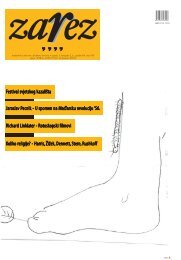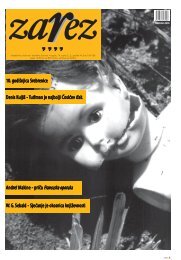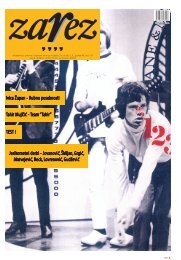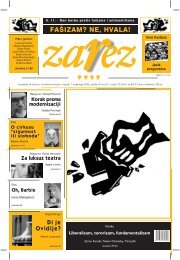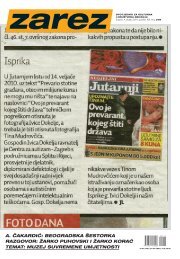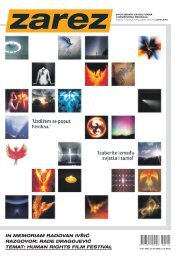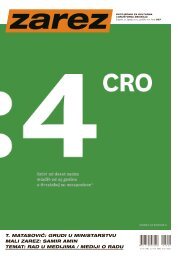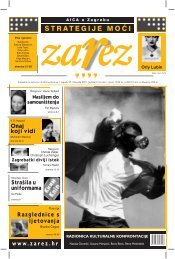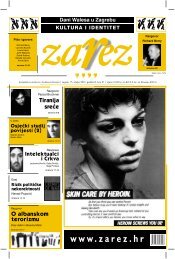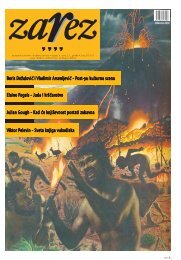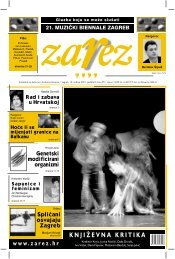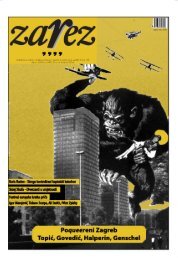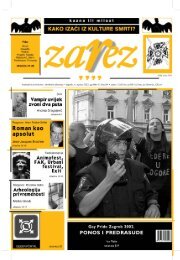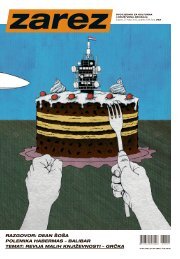26 II/40, 12. listopada 2,,,.Sonja Wild BiæaniæTwo Lines of Life/Dvije linije ivotatranslated from English by Mia Pervan, publishedby Durieux, Zagreb: 1999onja Wild Biæaniæ’s autobiography, originallywritten in English under the title Two Linesof Life, has now been published as a two-languageedition. Two Lines of Life is probably the perfecttitle for this book, since it encompasses twocountries, two languages, two wars, and even (if wetake into account the author’s private life) two marriagesand two children. The coherence and intelligenceof her writing becomes a<strong>pp</strong>arent as soon asone begins reading her book. In times when war andautobiographical writings comprise the largest partof fictional production, Sonja Wild Biæaniæ succeedsin talking both about herself and the <strong>Croatian</strong> history,offering a new outlook, unencumbered byideology. She is an excellent observer, and her Englishorigin provides her with sufficient distance tojudge the last fifty years with both objectivity andlove.Dušanka ProfetaViktor IvanèiæDotting Our U’s –The Šakiæ Case:Anatomy of a Scandalpublished by Feral Tribune, Split, 1998; secondprinting 2000onsidering the fact that Ivanèiæ has alreadydedicated a series of newspaper articlesin Feral to the Šakiæ case, the phenomenonof Independent State of Croatia and toTuðman’s doctrine of national reconciliation, areader would be forgiven for thinking that thisis a collection of previously published articles, acustomary practice of our star columnists.However, this is not the case; only some smallportions of the text have been published in Feral.In terms of composition, this book is a coherent whole; its rhetoric and argumentationfar surpass the simplicity of journalistic style, transforming it instead into a politicaland psycho-sociological treatise. Although he uses the relevant literature on philosophyand political science (H. Arendt, J. Benda, I. Bibo, P. Sloterdijk, E. Canetti,D. de Ruogemont, E. Cioran and others) in his analysis of the cult of nation and state,and the parallels between the Independent State of Croatia and the contemporaryRepublic of Croatia, he is not a scholar, but rather a dedicated political journalist whoa<strong>pp</strong>roaches his subject matter with passion, never hiding his own opinions.The starting point of Ivanèiæ’s analysis is the neurosis of the current <strong>Croatian</strong> regime,dismayed by the global pressure to put Dinko Šakiæ on trial. At the same time, hediscusses the identical attitude of the majority of “liberal” <strong>Croatian</strong> intellectuals whocannot comprehend why the world is forcing Croatia into opening those old wounds.Everyone realizes that this case is a litmus test to determine the real attitude of the regime,and the <strong>Croatian</strong> public as a whole, towards the fascist heritage…“Glorifying the state (including the Independent State of Croatia) as an empty absolute,the perfect frame to end historical and social development, by emptying thatframe in mass consciousness of its sickening content, by airbrushing crimes, terrorand violence committed in its name, all of this is expedient and necessary to concealand downplay the outrages committed in the name of today’s Croatia. This idealizedempty frame that races through eras and epochs stri<strong>pp</strong>ed of any content that mightdistract from its gilding is su<strong>pp</strong>osed to be our only available reality and unique ideologicaltruth.”The closing chapters of the book deal with Franjo Tuðman as the main protagonistof this ideology. Ivanèiæ pays particular attention to Tuðman’s Wilderness of HistoricalReality, proving that this book represents Tuðman’s defense of genocide. Tuðman istrying to prove that genocide can be a useful social tool in human history, affectingthe future of the nation in a positive way, particularly in terms of its natural ethnic landholdings. For him, nationalist state is the only option, which requires the highestpossible degree of ethnic homogenization and the highest possible conformity betweenethnic structure of population and state boundaries. Ivanèiæ concludes: “Tuðman'sreal purpose in The Wilderness is giving crimes meaning. In keeping with his guiseof fatalist historian, he sees the occurrence of crime as a given, as a historical predestination,or, in his own words, as an “endless repetition”. His scholarly eye is notfocused on examining the roots and origins of evil – which is inescapable, don’t youknow, like the ground we walk on – but rather on providing evil with a<strong>pp</strong>ropriate senseand reason.”Ivanèiæ pays particular attention to Tuðman's doctrine of national reconciliation andhis wish to build a shrine to this idea in Jasenovac, where he would bury the jumbledbones of everyone who died for the dream of independent state, regardless of whothey fought for…Although conceived as an analysis inspired by the Šakiæ case, Ivanèiæ’s book doesnot dwell so much on the history of the Independent State of Croatia and its regime;he has no doubts about its fascist nature. He is far more interested in examining thecommon ground between political doctrines of the two regimes, the former one andthe contemporary one. Although he sometimes comes off a little too impassioned, hisanalysis of our society’s phenomena is for the most part extraordinarily lucid an intelligent,and his o<strong>pp</strong>osition to the prevailing intellectual conformity is nothing short ofcourageous.Velimir ViskoviæWar in Bosnia and Herzegovina1991 – 1995edited by Branka Magaš and Ivo aniæ,published by Naklada Jesenski i Turk and Dani,Zagreb – Sarajevo: 1999he book War in Bosnia and Herzegovina 1991–1995 is a collection of papersthat were presented at the conference dedicated, as we used to say, to Thirdworld countries. I will give the list of paper presenters in alphabetical order:Dušan Bilandiæ, Norman Cigar, Jovan Divjak, Marko Attila Hoare, RusmirMahmutæehajiæ, Stjepan Mesiæ, Warren Switzer, Martin Špegelj, Anton Tus, Paul Williamsand Ozren unec. The conference was held in Budapest, during September1996. It was organized by The Bosnian Institute from London and The Institute forSouth-East Europe from Middle-European University in Budapest. The discussionswere held in three main thematic sections: War in Croatia, War in Bosnia and Herzegovinaand International Response: Lessons for the Future, with additional section, presentedby Ofelija Backoviæ, Miloš Vasiæ and Aleksandar Vasoviæ, called: Is there anyonewho is ha<strong>pp</strong>y to become a soldier – mobilization crisis – analytical survey of media coverage.At the end of the book reader will find The Chronology of Events 1985–1995,an article on the organization of Yugoslav National Army and various geographicalmaps. In my opinion, this book will remain influential for a very long time. In contrastto the usual monological talking and writing about the war, this book really containsdialogues: it is open, provocative and surprising. I have never come across a similarpublication before…Here we discover that there are war subjectson which we can agree, at least partly; or wecan agree on certain aspects of some question.Of course, the conversations in the book revealmany more subjects which are still, bothpublicly and privately, in question, for the simplereason that the data on them is either illogicalor missing…War never offered any Biblical solutionsabout the truth, but it has opened a tremendousspace for the discussion of it. We will haveto accept it and participate in it. After readingthis book, those who were brave and dedicatedenough to initiate or prepare these conversationsare left with personal doubts andpersonal answers. I recommend the book toeveryone. If for no other reason, than for thefact that at least it teaches us how to raisequestions.Grozdana CvitanStanko AndriæDiary from the YugoslavNationalArmy andOther Glosses andArabesquespublished by Durieux, Zagreb, 2000tanko Andriæ's fictional and essayistoeuvre consists of History of Slavoniain Seven Conflagrations (1992)and Encyclopedia of Nothingness (1995),plus the various texts from the newspapers.The book Diary from the Yugoslav NationalArmy and Other Glosses and Arabesques largelycomprises Andriæ’s journalistic writing.One of the main features of Andriæ'sscholarly and fictional writing is the attentionhe pays to interior structure; balancingthe particular in relation to the textualwhole. In his new book, Andriæ continuesthe same practice. He divides texts into "glosses", treatises and "arabesques", managing toavoid the classification term "essays" (an a<strong>pp</strong>ropriate move, considering that some texts inthe book certainly couldn’t be qualified as essays). Glosses refer to the texts that resultedfrom his previous reading (Hugo Pratt, Hamvas...) and the texts that to some extent resembleliterary criticism, essayistic or autobiographical writing. In his treatises, Andriædiscusses etymology, separatism, fear of cancer, millennial anxiety and many other issues.By calling these texts "treatises", Andriæ plays with the reader and exhibits signs of self-irony:specifically, in contemporary vocabulary, treatises are long, boring, overloaded withdata and prim writing. Andriæ's texts are just the o<strong>pp</strong>osite: balanced, interesting, and writtenwithout any desire to dazzle the reader with academic knowledge. The smallest groupof texts are called "arabesques", and this is where part of Andriæ's diary from the book titlecan be found. Andriæ's diary teems with notes (usually a sentence or two) about thebooks that he read or is planning to write about. When he writes about his "immediate environment"(army), he does so as a distanced observer, enclosed within the boundaries ofhis inner self, capable of understanding the whole pointless world around him only as metaphor.I will quote one: on the sidewalk, the soldier stands still, while the fork from his messkit sticks out greedily (from the text The Border, August 7, 1987). Andriæ's place in contemporary<strong>Croatian</strong> fiction is not very different from the place he has chosen for himself inthe army: in all the fuss of recent fiction trends, poetical or generational preferences ofStanko Andriæ lie with the personal and private world – no less vivid because of its splendidisolation.Dušanka Profeta
II/40, 12. listopada,,,. 27Bora ÆosiæCustom Declarationpublished by Feral Tribune, Split, 2000.eckett's Malone is paralyzed. He is laying in bed, waiting for death to come. Using a longstick with a hook, he draws to himself objects within the reach. He makes inventory of hislife. And he tells stories.Bora Æosiæ does not have his fictional character, his Malone. Instead of it, he is the one, in flash,who sits alone in a large, empty room of his Berlin apartment. The emptiness of his room mustbe horrible, unbearable. He makes a mental list of personal belongings to declare to the custom'soffice; this inventory declaration will allow him to transport his former life legally from thecountry he used to consider his homeland to the new country, where he will live under the different,foreign sky. Both of our heroes, Malone and Æosiæ, finally conclude that there is not much todeclare. Both of them conclude that what they have been collecting all their lives is, in fact, emptiness...That is why I understand Æosiæ's Custom Declaration and Beckett's Malone Dies as complementaryliterary works. In many details, in many thoughts, they are similar, but in the final runthey drift apart. Beckett's Malone dies, and Bora starts all over again – with a baggage full of emptiness...Custom Declaration is a testimonial, lyrical, metaphysical, and philosophical essay about typicalstrollers of our century. It is "a chronicle about migration, a chronicle that has been lasting fromthe days of youth..." In order to be free, Æosiæ firmly believes (and we must agree with him) thatone has to "leave one’s own country simply to have some rest". If the country that one "belongsto" starts to weigh down on a person, it is one’s own fault, because the country knows nothingabout itself, let alone about being this person's country. It is us that declared the country our ownand thereby committed the biggest mistake possible..."As Æosiæ himself admits, he is, in fact, "taking the graduation exam in leaving his own country"(and a very important exam, especially if one wants to become of age and maturity). Æosiæ takeshis time. Without any "nervousness", he studies "deep science of emptiness". He notices how "wehave lived in the area in which there was always toomuch history; far too much for a person to handle."He wants to change this for the better, at least a littlebit.While he leaves "the Balkan inn, where everyone hasbeen eating and drinking until nothing was left", Æosiæmaintains an ironical distance between both himselfand his destiny, which is another quality of this book.He does not think that he was sentenced to that kindof life; he knows he has chosen it...Custom Declaration is cathartic for the author asmuch as for his “fellow comrades" from the previousdecade; the ones who are now aware that they belongedto the "unknown civilization trash". Their war endsby defeat. The war campaign, lead by the whole century,has been “a cause lost long ago”, and the defeatwas created in foreign generals' offices. Custom Declarationis a masterly written fugue. Not the death fugue,but the fugue for a new day. Well, day by day...Daša DrndiæPredrag MatvejeviæVidoslav Stevanoviæand Zlatko DizdareviæMasters of War and Peacepublished by Feral Tribune, Split, 1999he book, already published in Italy and France,has been conceived as a report on Balkanrulers, where Miloševiæ is portrayed by a Serbiandissident writer, Vidosav Stevanoviæ, Tuðmanby Predrag Matvejeviæ, and Izetbegoviæ by a Sarajevojournalist Zlatko Dizdareviæ.Bigraphers specializing in political rulers typicallymanage to find at least some small elements of humanityin their power-wielding subjects, if for no otherreason, than to provide justification and explanation for their actions. Stevanoviæ, however,finds not a trace of humanity in the president of his country. "Slobo" is just a bare politicalfunction from Dedinje that a<strong>pp</strong>ears before the people wearing a grim bureaucraticsuit. His humor is simply a rehearsed political routine and his smile is a fake. His wordsare lies and the essence of his existence is his endless lust for power: This is Stevanoviæ’stake on the fifteen long years of Miloševiæ's regime...Unlike Stevanoviæ, Matvejeviæ is interested in the personality of the ruler, which iswhy his portrayal of Tuðman is replete in quotations from Tuðman's customarily mystifyingpronouncements, strategic statements and intellectual fantasizing we so enjoyedhearing when he was alive. Tuðman comes off as a pathological liar, a Narcissus with acrooked u<strong>pp</strong>er lip, whose obsession with history is comparable only to his obsessionabout his place in the historical hall of fame. His pathological state of mind, suggestsMatvejeviæ, is the source of many <strong>Croatian</strong> troubles...Just like his pals "Slobodan" and "Franjo", "Alija" was also successful in getting rid ofhis more popular partners. While hiding behind statements like "This is not our war" and"The one who shots knows", Alija created a public impression of a reasonable man; hepresented himself as a slightly naïve old man who devoted his whole life to the prosperityof his people. Like hell, says Dizdareviæ. Izetbegoviæ used the war years to mould thewhole political system to his autocratic rule, to say nothing of numerous catastrophic decisionsthat left Bosniacs completely unprepared for the war or the fact that he installedhimself as the ultimate leader of Bosnia and Herzegovina... Like his friends from Zagreband Belgrade, Izetbegoviæ today enjoys all the luxuries and spoils of the war, i.e. luxuriespaid with the money of taxpayers who are left to gra<strong>pp</strong>le with the burden of poverty ontheir own.Dragan KorugaJakša KušanBattle for The New Croatiapublished by Otokar Keršovani d.o.o, Rijeka, 2000akša Kušan’s Battle For The New Croatia is an autobiographical account of histhirty years of publishing The New Croatia, a journal he started in London andwhich was for many years considered the most influential emigrant publication(not only because of its circulation, but also because of its reception in Croatia). TheNew Croatia was a thorn in the side of both Udba (Yugoslav Secret Police) and the <strong>Croatian</strong>emigrant circles. Kušan's book consists of his reprinted editorials and his public andprivate letters (in which he explains the goals and policy of the journal). With the exceptionof the journal’s editorial board, his associates and simphatzers, Kušan demonstrateshow little consensus was achieved between different emigrant groups around the world.He admits to minor disagreements on the disunited emigrant scene but only hints at theexistence of major conflicts. He also provides the information on the beginnings and relativesuccess of <strong>Croatian</strong> National Council in rallying theCroats scattered all over the world.The dark side of the emigrant scene is best describedthrough the activities of Udba and its attempts to get tothose emigrants considered dangerous to Yugoslaviathrough various “friends”, with the goal of “neutralizing”the targets under suspicion at all costs. Framing a suspectwas considered "mild" and assassination the most extremeof Udba’s tactics. The executors of these "measures" rangedfrom convicted criminals and professional assassinsto Yugoslav citizens who worked abroad and were blackmailedinto cooperation with Udba. The latter group oftentried to sidestep Udba’s orders in various ways. ButKušan also remembers those who didn’t have to be blackmailed,who willingly volunteered their services to helpUdba.Grozdana CvitanIlija JakovljeviæConcentrationCamp on Sava Riverpublished by Konzor, Zagreb, 1999esides being a schoolmaster who worked in Sarajevoand Zagreb, <strong>Croatian</strong> writer and lawyer, editorin-chiefof the influential <strong>Croatian</strong> politicalnewspaper called Hrvatski dnevnik (owned by the <strong>Croatian</strong>Peasant Party) and a one-time president of the <strong>Croatian</strong>Writers’ Association, Ilija Jakovljeviæ, born in the TurkishQuarter "Podhumska mahala" in the city of Mostar(1898), also had "the honor" of becoming a prisoner of noless than three different dictatorships. First the dictatorshipdeclared in monarchist Yugoslavia on January 6, 1929,then the Ustasha dictatorship during the Second WorldWar, and, finally, after the war, the Communist dictatorship.He died in a communist prison at the end of October 1948, under mysterious circumstances,thus becoming what we call a "non-person" during all the subsequent years of the Communistrule. This biographical data is also where we must look for the reasons why the account of atrocitiesin the Ustasha concentration camp Nova Gradiška, where Jakovljeviæ spent more than ayear (from October 1941 until December 1942), is being published only now, after being almostforgotten for more than half a century. This question becomes especially vital once we realize thatJakovljeviæ's work is the first important document about "Ustashia" (Jakovljeviæ's term) that wentpublic in the period after Croatia has proclaimed its independence from Yugoslavia.Let us therefore begin with the conclusion: this is the most important book that has a<strong>pp</strong>earedin Croatia in a very, very long time. It is precisely because Jakovljeviæ was so perfectly perceptiveand analytically bold, as well as contemptuous of any mystification, that his chronicle is preciousto us – both literary and historically. It encompasses pain and despair, a sense of survival, pity, defiance,and a good deal of astuteness. It strips the Ustasha demagogy bare, revealing the so-calledIndependent State of Croatia for what it was: a reign of hardened criminals. Jakovljeviæ knew thecomplete truth about Ustashas and could not be seduced by their apologetic stupidity that preached"blossoming" of <strong>Croatian</strong> culture "despite the unsuitable circumstances" of the present war.(...)It is difficult to evoke all the richness of Jakovljeviæ's testimony. The book also offers numerousproofs about the resistance to the committed atrocities, even among freshly recruited Ustashas.(...)Jakovljeviæ's observations about nationalism are of utmost importance (as he says: "It is a conflictof two philistine nationalisms, Ottoman brutality and a thousand year old cultural fakery"), as arehis views on differences between populist and ideological consciousness, and between Ustashas'"parlamentarism" and "Christian corporativism". It also provides the crucial testimony about importantpolitical leaders of the era (Jakovljeviæ on Budak: "he is the biggest thug ever to a<strong>pp</strong>earunder the mask of a writer, in any country in the world"). (...)In the preface to Jakovljeviæ's book, Ivan Lovrenoviæ points out that the discovery of Jakovljeviæ'smanuscript should be treated as "(...) one of the most important events of contemporary<strong>Croatian</strong> literature. Neither <strong>Croatian</strong> literature, nor <strong>Croatian</strong> self-image, can remain the same afterthis book." And he would be right, if only contemporary <strong>Croatian</strong> literature and historical self-knowledgecould be said to adhere to clear political, ethical and intellectual standards. However,that is rarely the case. This lack of standards is underlined not only by such trivial political arrangementsas banal majorette routines that accompanied the official unveiling of the most banalmonument imaginable, but even more by the fact that today's "blackcoats" (Jakovljeviæ's term)still celebrate Masses for Ustashas' Commander-in-Chief and his Commissioner. That is why thisbook, soaked in the blood of its author, shall remain one of those rare lights that a<strong>pp</strong>eared to himin visions during the period after Jakovljeviæ left Gradiška – visions that took the form of placeslike Jablanac, Gradine and Mlaka. He saw "that every clump of earth that covers the body of themartyr is now a beacon, lighting the roads to a new life." Until that ha<strong>pp</strong>y moment when <strong>Croatian</strong>culture finally reclaims its place European culture, and <strong>Croatian</strong> history learns the inestimablevalue of self-criticism, Jakovljeviæ's chronicle shall continue to light the way for all of us.Ivo Banac
- Page 2 and 3: 2 II/40, 12. listopada 2,,,.gdje je
- Page 4 and 5: 4 II/40, 12. listopada 2,,,.Davorka
- Page 6 and 7: 6 II/40, 12. listopada 2,,,.Nakladn
- Page 8 and 9: 8 II/40, 12. listopada 2,,,.Andrea
- Page 10 and 11: 10 II/40, 12. listopada 2,,,.Pjesni
- Page 12 and 13: 12 II/40, 12. listopada 2,,,.U uvod
- Page 14 and 15: 14 II/40, 12. listopada 2,,,.Irena
- Page 16 and 17: 16 II/40, 12. listopada 2,,,.o you
- Page 18 and 19: 18 II/40, 12. listopada 2,,,.n her
- Page 20 and 21: 20 II/40, 12. listopada 2,,,.In you
- Page 22 and 23: 22 II/40, 12. listopada 2,,,.Roman
- Page 24 and 25: 24 II/40, 12. listopada 2,,,.Miljen
- Page 28 and 29: 28 II/40, 12. listopada 2,,,.Marink
- Page 30 and 31: 30 II/40, 12. listopada 2,,,.Igor M
- Page 32 and 33: 32 II/40, 12. listopada 2,,,.eljko
- Page 34 and 35: 34 II/40, 12. listopada 2,,,.FRAKCI
- Page 36 and 37: 36 II/40, 12. listopada 2,,,.Miljen
- Page 38 and 39: 38 II/40, 12. listopada 2,,,.Sonia
- Page 40 and 41: 40 II/40, 12. listopada 2,,,.Marink
- Page 42 and 43: 42 II/40, 12. listopada 2,,,.Igor M
- Page 44 and 45: 44 II/40, 12. listopada 2,,,.eljko
- Page 46 and 47: 46 II/40, 12. listopada 2,,,.Frakci
- Page 48: 48 II/40, 12. listopada 2,,,.Hrvoje



